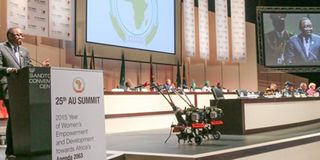Learn from ICC treatment of Africa: President Kenyatta

President Uhuru Kenyatta speaks during the 25th AU Ordinary Summit in Johannesburg. The African Union says about 14 million under-age girls are married on the continent each year — almost all of them forced to by their parents, often against laws that are rarely enforced.
What you need to know:
- Head of State tells AU summit that African court should be strengthened.
President Uhuru Kenyatta says the way the International Criminal Court treats Africans should inspire the continent to strengthen its own court.
In a statement delivered to the AU on Monday, President Kenyatta said there are plenty of “lessons” to be learnt from the way the court has been dealing with African cases.
“The emerging experience and lessons learnt dictates [that] we re-examine ourselves and determine our destiny,” he told the 25th AU Ordinary Summit in Johannesburg, South Africa.
“We should aim to protect and sustain our independence against all negative forces and uphold the dignity and sovereignty of the African continent and our people.”
President Kenyatta spoke amid controversy over whether South Africa should have arrested Sudanese leader Omar al-Bashir. A South African court had ordered Bashir arrested and handed over to the ICC.
The Sudanese leader, 71, has been indicted for five counts of crimes against humanity, two counts of war crimes and three counts of genocide in the way his military quelled a mutiny in Darfur.
He managed to leave South Africa but President Kenyatta, who referred to al-Bashir as “our brother”, argued the debacle concerning the Sudanese leader shows the ICC is no longer objective.
“We must maintain our common zeal to make the court responsive to the interests of Africa and the spirit that evolved the Rome Statute,” he said.
'TARGETING AFRICAN LEADERS'
The Africa Union has recently led a common chorus against the ICC which most leaders on the continent feel targets them.
President Kenyatta, who was also once indicted by the court although the charges were dropped in March, called on African leaders to push for the charges against his deputy William Ruto to be dropped.
“The withdrawal (of charges against me) vindicated our commonly held view that the ICC has been targeting African leaders for indictment without any tangible evidence.
“I remain optimistic that a fair and impartial court that examines the evidence so far presented to the court will return a ‘No Case to Answer’ verdict very soon against my Deputy President and also drop the outstanding warrants of arrests against our dear brother.”
Last year in Malabo, Equatorial Guinea, the AU resorted to strengthen the African Court of Justice and Human Rights to enable it to try crimes against humanity, war crimes and genocide.
Kenya signed the treaty in January and pledged to give Sh95 million to the formation of the Court which AU argued will not target sitting heads of state. The Protocol needs 15 ratifications for its entry into force. President Kenyatta urged African countries to sign the treaty.
Formed in 2002 after countries passed the Rome Statute, it was meant to try individuals accused of crimes against humanity, genocide and war crimes. But its 20 criminal investigations and cases in eight African states has inspired the leaders to defend what their call an encroachment on their sovereignty.
Mr Ruto, who faces charges of crimes against humanity related to the 2008 post-election violence, is fighting a bid by the prosecutor to use evidence whose witnesses have either recanted their testimony or refused to testify.
Judges are expected to rule on the matter on July 12 but President Kenyatta accused prosecutors of acting in fear.
“The prosecutors desperate action is in total violation of the understanding reached by States Parties to the Rome Statute during negotiations on the amendments of Rule 68,” he argued.
The rule the prosecutor is standing on was amended during the 12th Session of the ICC Assembly of States Parties in December 2013 to allow for admission of prior recorded testimony.
Kenya argues that the amendment was based on an understanding that it would not be applied retrospectively and that the rule would not applied to the Kenya cases.




